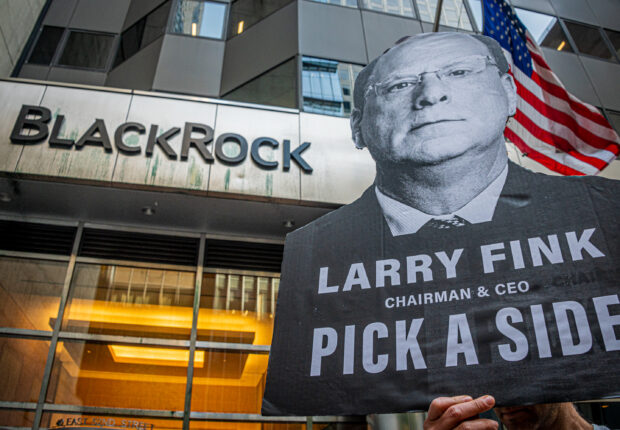New report shows BlackRock and Vanguard voted against critical shareholder resolutions, torpedoing efforts to fight the climate crisis.
In 2019, BlackRock and Vanguard, the world’s largest asset managers used their shareholder power to undermine global investor efforts that would have pushed large fossil fuel and utility companies to take concrete action on climate change, according to a new report by Majority Action. Key energy and utility companies in the U.S. lag far behind in transforming their businesses to meet the Paris Agreement on Climate’s target of limiting global warming to well-below 2 degrees Celsius and aiming for 1.5 degrees. Leading investors worldwide are pushing these companies to align their strategies to these targets. Despite BlackRock and Vanguard’s public statements about the importance of corporate leadership on climate change, they have used their stakes as the largest shareholders in most of these companies to shield leadership from accountability.
Climate in the Boardroom: How Asset Manager Voting Shaped Corporate Climate Action in 2019 is an annual analysis of asset manager votes on key shareholder efforts around climate change from Majority Action, a nonprofit organization that empowers shareholders to hold corporations accountable to high standards of corporate governance, social responsibility, and long-term value creation. The full report tallies the frequency with which 25 of the largest asset managers––who collectively manage over $38 trillion––supported management-backed directors, executive pay plans, and key climate shareholder resolutions during the 2019 proxy season.
“While BlackRock and Vanguard regularly tout their commitment to protecting shareholder value and claim to prioritize corporate responsibility on climate change, they are in fact using their considerable shareholder power to shield industries driving the climate crisis from accountability,” said Eli Kasargod-Staub, executive director of Majority Action. “Just last month, BlackRock sounded the alarm that ‘climate change is a risk investors can’t ignore’ and both joined with other business leaders in a sweeping statement that protecting environmental and community stakeholders is integral to their purpose. As the world’s largest investment managers, millions of Americans depend on BlackRock and Vanguard to protect their portfolios by ensuring that fossil fuel companies are being held accountable to our net-zero future. And unlike so many individuals, BlackRock and Vanguard’s leadership actually has the power to dramatically shift how corporate boards are responding to our climate crisis. But clearly neither BlackRock nor Vanguard will live up to their rhetoric unless we demand it.”
The key findings of this review include:
- BlackRock and Vanguard voted for 99% of U.S. large capitalization energy and utility company-proposed directors and 100% of their say on pay proposals. BlackRock and Vanguard not only voted with management more often than most of their asset manager peers; they were also more likely to support management at these fossil fuel intensive companies than they did across U.S. equities overall.
- BlackRock and Vanguard voted overwhelmingly against the climate-critical resolutions reviewed in this report, with BlackRock supporting just five of the 41, and Vanguard only four. At least 16 of these critical climate votes would have received majority support of voting shareholders if these two largest asset managers had voted in favor of them. These included proposals that would have held ExxonMobil’s board accountable for failure to engage responsibly on climate change, and brought much-needed transparency to the lobbying efforts of Duke Energy, the largest, highest emitting, and highest coal-using electric utility in the United States.
- BlackRock and Vanguard voted against all of the U.S. shareholder proposals backed by the Climate Action 100+ investor coalition, with $34 trillion in assets, undermining the largest global investor efforts for accountability and transparency in the energy and automotive sectors.
- In contrast, other large asset managers chose to set and enforce policies to hold corporate boards accountable if climate-related concerns are not adequately addressed. Legal & General Investment Management, BNP Paribas Asset Management, PIMCO, and Standard Life Aberdeen had the highest rates of voting against director candidates in the oil and gas and utility industries. Legal & General, BNP Paribas, and PIMCO also supported over 95% of the shareholder proposals analyzed in this study, as did DWS Group, voting in favor of improved emissions disclosures and reduction plans, transparency regarding corporate political influence activity, and governance reforms to improve accountability to long-term shareholders.
“Proxy voting is a vitally important responsibility of ownership, and the size of shares held by firms like BlackRock and Vanguard makes their votes even more significant,” stated Timothy Smith, director of ESG Shareowner Engagement for Boston Trust Walden. “BlackRock defends their substandard voting record by arguing that they actively met with and engaged 256 companies about climate change. While it is important for investors to privately press companies they own on climate change, the urgency of the ticking climate clock requires huge stockholders to step up and support thoughtful shareholder proposals on climate change.”
“Large asset managers like Blackrock and Vanguard can move the market,” said Jeanne Martin, senior campaigns officer at ShareAction. “Yet, their proxy voting records reveal that their sustainability rhetoric is all talk and no action. Pension funds should challenge asset managers that fail to use their voting rights to hold high-carbon companies accountable.”
Based on these findings, Majority Action recommends that asset owners closely examine the engagement and proxy voting activities of the asset managers they engage, call the asset managers they hire to account for inadequate voting policies and practices, and consider those activities when evaluating and selecting asset managers. Policymakers should consider reforms to ensure transparency, regulate conflicts of interest, and address the rapidly increasing market share of the largest asset managers.
The report was covered in the Guardian and Bloomberg.
Activists from our campaign partners brought the report to the headquarters of BlackRock in New York City and Boston. See this post for more.
__
MAJORITY ACTION is a nonprofit organization dedicated to empowering shareholders of all sizes to hold corporations and their leadership accountable to high standards of long-term value creation, corporate governance, and social responsibility.

